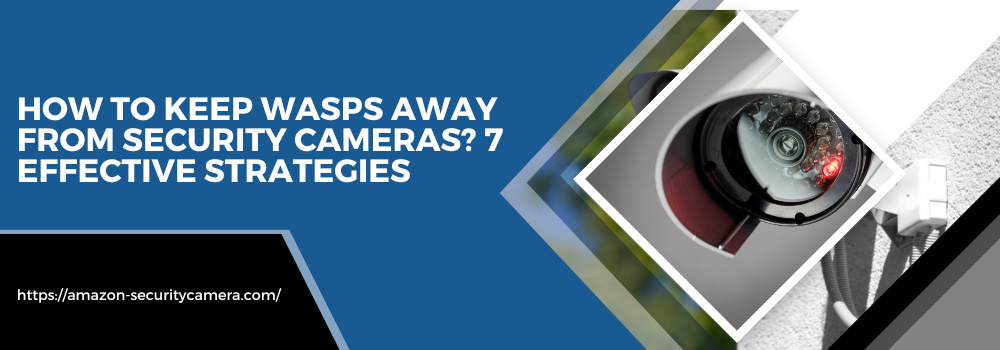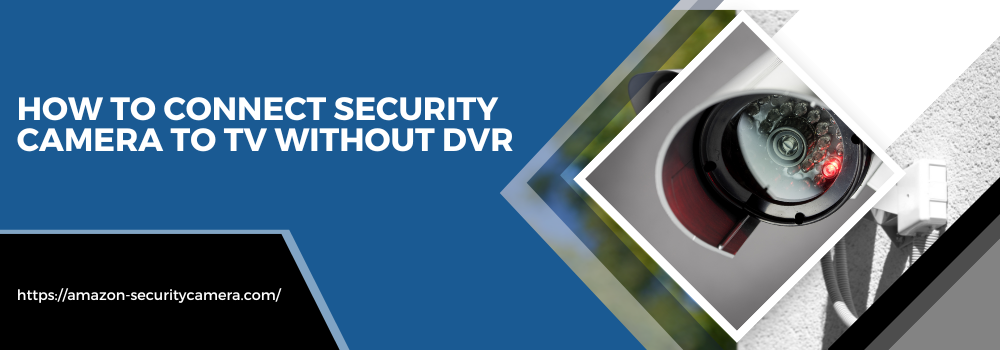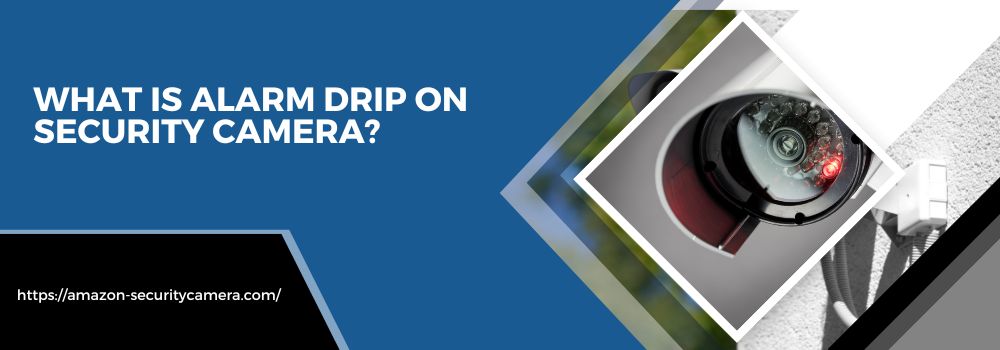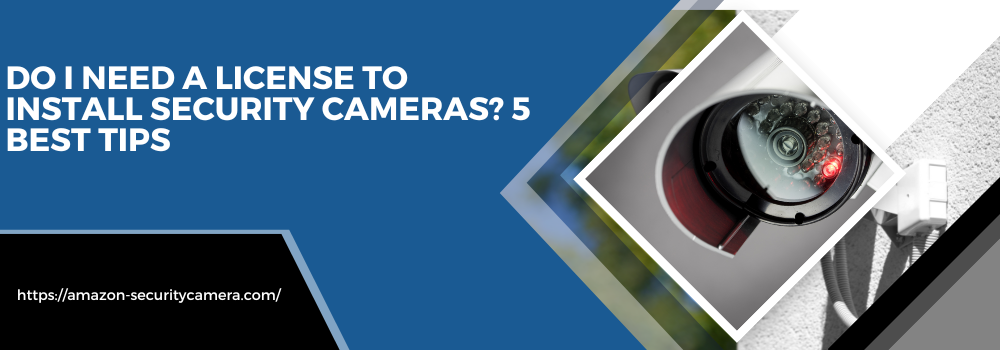How to Keep Wasps Away from Security Cameras? Are you a homeowner, property manager, or security system user who has had to deal with pesky wasps buzzing around your outdoor security cameras? It can be very frustrating and even dangerous—wasps can chew through wiring and interfere with the signals of your camera. Fortunately, there are several effective strategies that you can use to keep wasps away from your security cameras so they miss out on disrupting those important surveillance efforts!
Let’s dive right into the wasp-free world! Imagine your security cameras humming along smoothly, minus the buzz of unwanted wasps. No more tiny invaders chewing through wires or blocking the view. Sound like a dream? Well, it’s about to become your reality! Get ready to take action and fortify your security systems against these pesky pests. Let’s march ahead to discover seven effective strategies that will turn your cameras into no-fly zones for wasps.
In this blog post, we will cover seven proven methods for keeping wasps away from your outdoor security cameras. So read up and get ready to vanquish these unwanted visitors – it’s time to reclaim your space!
How to Keep Wasps Away from Security Cameras?
Read below to learn about How to Keep Wasps Away from Security Cameras.
Read another article about How to install – Night Owl Wired Security Cameras. Best Step-by-Step Guide 2023
Table of Contents
Understand why wasps may be attracted to security cameras – such as food sources and heat
Wasps are attracted to security cameras for a few reasons, primarily for warmth, shelter, and nearby food sources. Recognizing and eliminating these factors can help in deterring them from nesting near your cameras.
- Warmth: Security cameras often emit heat which attracts wasps, especially during colder seasons. Consider using heat-resistant covers or thermal insulation.
- Shelter: Cameras provide sheltered spots for wasps to build nests. Regular cleaning and the use of anti-nesting sprays can deter this.
- Food Sources: If your camera area is near plants or food waste, it could attract wasps. Ensure regular cleaning of these areas.
- Light: Some wasps are attracted to light. Use motion sensor lights or infrared light that wasps cannot see.
- Color and Shape: Wasps are often attracted to certain camera designs. Consider using designs and colors that are less appealing to them.
Trim vegetation around the camera to reduce potential hiding spots for wasps
Vegetation around the camera can provide coverage for wasps, inviting them to build nests. Trimming vegetation around the camera will reduce potential hiding spots and discourage wasps.
- Tree Branches: Trim overhanging branches that provide shelter to wasps.
- Shrubs: Cut back shrubs near the camera, as they can be potential nesting spots.
- Flowers and Fruits: Remove flowering plants or fruit-bearing trees near cameras to eliminate food sources.
- Garden Debris: Clear garden debris promptly to avoid attracting wasps.
- Regular Maintenance: Regularly inspect and maintain the surrounding area to prevent wasp infestation.
Use a bug zapper around the camera to encourage wasps to stay away
A bug zapper is another effective deterrent for wasps. The high-frequency buzzing sound and flashing light of a bug zapper are usually enough to keep them at bay. This strategy can be particularly useful if your camera is located in an area prone to insect activity.
- Placement: Install the bug zapper near the camera but not so close as to interfere with its operation.
- Size: Choose a zapper that is adequate for the wasp population in your area.
- Safety: Ensure the zapper is safely installed and away from children’s reach.
- Maintenance: Regular cleaning and bulb replacement will ensure optimal performance.
- Backup: Consider having a backup zapper in case one fails.
- Power Supply: Ensure a continuous power supply for consistent performance.
- Noise Level: Consider a quieter zapper if noise is a concern in your area.
Make sure all entry points into the camera housing are blocked off
Blocking all potential entry points into the camera housing is an effective way to prevent wasps from nesting inside. This not only safeguards the camera’s functional components but also minimizes the chances of interference from these pests.
- Sealant: Use a high-quality sealant to close any gaps.
- Wire Mesh: Cover openings with a wire mesh to block out wasps.
- Housing Design: Opt for camera housing designs that do not have unnecessary openings.
- Professional Inspection: Have your security camera system professionally inspected for potential entry points.
- Regular Checks: Conduct regular checks to ensure the seals and blockages are intact.
Change your light bulbs regularly or use motion-activated lights around the security camera
Wasps are attracted to bright lights, and changing your bulbs regularly or opting for motion-activated lights can help deter them. These types of lights also conserve energy and only illuminate when needed, reducing the overall attraction for wasps.
- Energy Efficiency: Opt for LED bulbs which are energy-efficient and less attractive to wasps.
- Motion-Activated Lights: These lights only activate when movement is detected, reducing the chance of attracting wasps.
- Bulb Color: Choose bulbs in the yellow spectrum, as they are less attractive to insects.
- Regular Maintenance: Keep up with bulb changes and maintenance to ensure effectiveness.
- Professional Installation: Engage a professional to install the lighting system correctly.
Spray insecticides around the camera housing and check every few weeks
Spraying insecticides around the camera housing can keep wasps away. It is recommended to check every few weeks to ensure the effectiveness of the insecticides and reapply as needed.
- Type of Insecticide: Choose an insecticide specifically designed to deter wasps.
- Frequency: Spray every few weeks, or as directed on the insecticide label.
- Coverage: Ensure all key areas around the camera are covered.
- Safety: Wear protective gear during application to avoid contact with skin or eyes.
- Residue: Clean any insecticide residue off the camera lens to ensure clear visibility.
- Professional Assistance: Consider professional pest control services for severe infestations.
- Alternative Options: Explore natural insecticides or deterrents for environmentally friendly solutions.
Call a professional pest control service if you can’t get rid of wasps on your own
If wasp infestation persists despite all your efforts, it’s time to call a professional pest control service. These experts have specialized knowledge and tools to safely and effectively eliminate wasps, ensuring the functionality of your security cameras.
- Expertise: Experienced pest control services know how to handle wasp infestations safely and effectively.
- Equipment: They have access to professional-grade equipment and insecticides.
- Safety: Professionals are trained in the safe use of pest control chemicals, minimizing risks.
- Efficiency: They can quickly identify and eliminate wasp nests.
- Prevention: Professionals can provide advice on preventive measures to avoid future infestations.
- Guarantee: Most pest control services offer a guarantee, ensuring the problem is fully addressed.
- Time-Saving: Hiring a professional allows you to focus on other important tasks without the worry of wasp infestation.
Conclusion
In conclusion, protecting your security cameras from wasp infestations involves a multifaceted approach, including regular maintenance and utilization of deterrents such as bug zappers, insecticides, and proper lighting. If the problem persists, professional pest control services offer an efficient and effective solution. Implementing these preventative measures will ensure the longevity and functionality of your security cameras, providing peace of mind in your surveillance efforts.
Faqs
Q: How often should I replace the bulbs in my motion-activated lights to deter wasps?
A: While there are no hard and fast rules, it’s advisable to replace your bulbs at least once a year. However, always monitor your lights and change the bulbs as soon as they begin to dim.
Q: Is it safe to use an insecticide around my security cameras?
A: Yes, it is safe provided you are careful not to get any on the lens of the camera. Always wear protective gear while applying the insecticide and clean off any residue that may land on the camera immediately.
Q: What type of sealant should I use to block entry points in the camera housing?
A: Use a high-quality, weather-resistant sealant. Silicone-based sealants are typically recommended for their durability and effectiveness.
Q: Can I install a bug zapper myself, or should I hire a professional?
A: While it is possible to install a bug zapper yourself, hiring a professional ensures it’s done correctly and safely, especially where electricity is involved.
Q: How often should I hire a professional pest control service to check for wasp infestations?
A: If you notice the presence of wasps frequently despite your efforts, it’s advisable to hire a professional pest control service. However, an annual inspection could be beneficial even if you don’t notice an ongoing problem.



